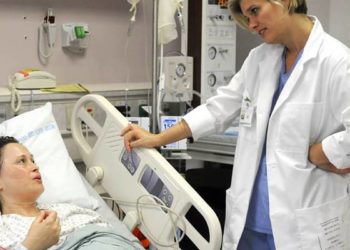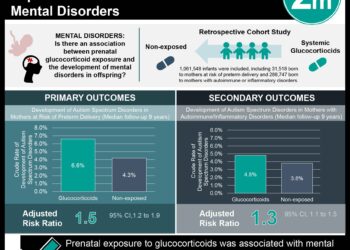#VisualAbstract: Association between antidepressants during early pregnancy and risk of birth defects
1. Many first-line agents for depression and anxiety – including specific SSRIs, bupropion, and especially venlafaxine – were associated with an increased risk of birth defects if used during early pregnancy.
Evidence Level Rating: 2 (Good)
The management of depression and anxiety during pregnancy is challenging, especially considering that they affect 7.1% and 19.1%, respectively, of the US adult population. As such, a robust understanding of the teratogenicity of drugs used to treat depression and anxiety is of the essence. This case-control study used data from the National Birth Defects Prevention Study (NBDPS) to examine associations between the use of specific antidepressants and select birth defects. 30,630 case mothers of infants with birth defects and 11,478 control mothers were included for analysis. Among them, 1,562 case mothers and 467 control mothers reported antidepressant use during early pregnancy. Mothers with antidepressant exposure during early pregnancy were compared with (1) mothers unexposed before or during pregnancy, and (2) mothers exposed only outside of pregnancy. In set one, mothers using venlafaxine during early pregnancy had an elevated risk for most examined birth defects, with some associations being quite strong (aORs 3.34 [95% CI 1.69 to 6.60] – 5.26 [95% CI 1.96 to 14.12]). Furthermore, it was found that among mothers using SSRIs, paroxetine and fluoxetine resulted in the highest risk for specific birth defects. No association between escitalopram use and birth defects was seen. In set two, many of the previously observed findings were attenuated, with some notable exceptions. Fluoxetine use was associated with coarctation of the aorta (aOR 2.06, 95% CI 0.89 to 4.74), while citalopram use was associated with atrioventricular septal defect (aOR 3.73, 95% CI 0.86 to 16.27). Despite adjusting for underlying conditions, the associations observed with venlafaxine use largely persisted; in some instances, such as for anencephaly and craniorachischisis, the association strengthened (aOR 9.14, 95% CI 1.91 to 43.83). Additionally, bupropion was associated with an increased risk of diaphragmatic hernia (aOR 6.50, 95% CI 1.85 to 22.88). In all, this study suggested that the use of specific SSRIs, bupropion, and venlafaxine during early pregnancy carry a varying risk of causing birth defects. Venlafaxine use, in particular, was associated with multiple birth defects. These data represent the first effort to characterize the teratogenic effects of specific antidepressants, and more work is needed to validate these findings.
Click to read the study in JAMA Psychiatry
©2020 2 Minute Medicine, Inc. All rights reserved. No works may be reproduced without expressed written consent from 2 Minute Medicine, Inc. Inquire about licensing here. No article should be construed as medical advice and is not intended as such by the authors or by 2 Minute Medicine, Inc.







